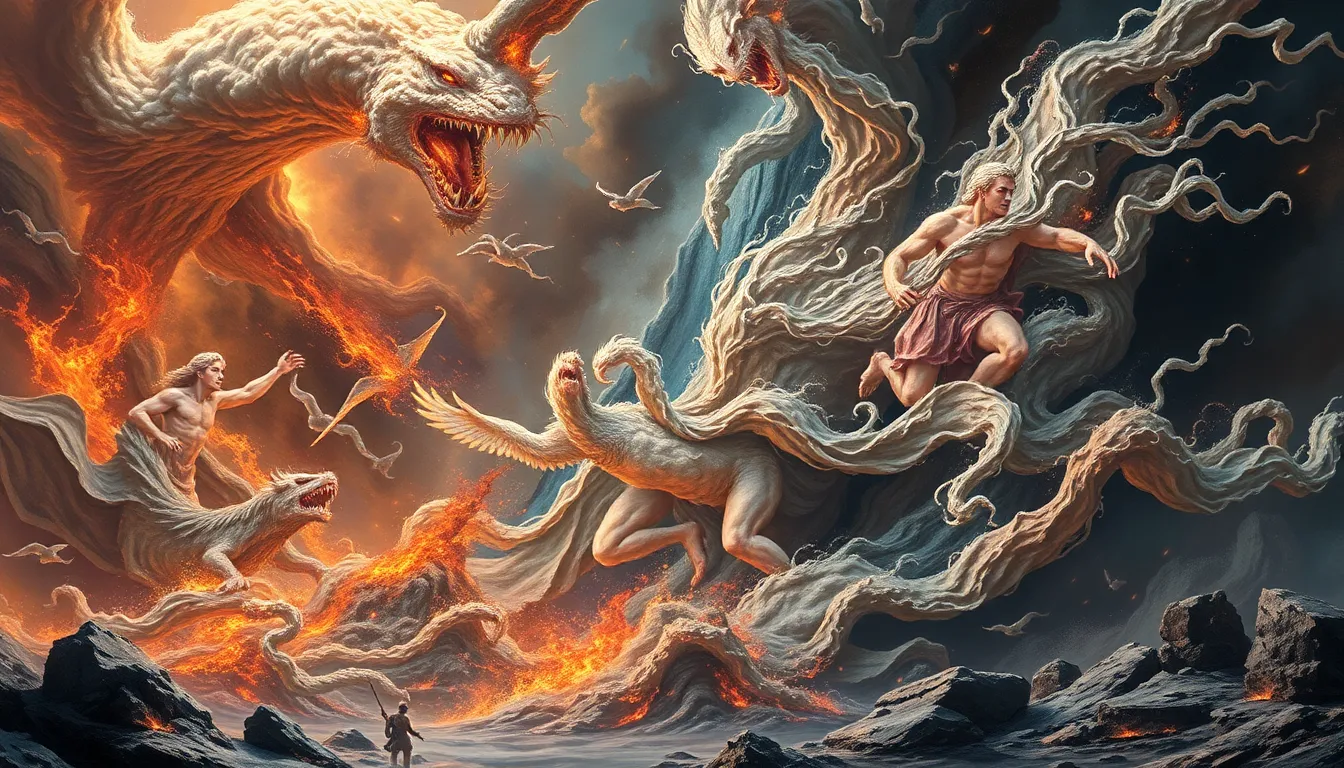The Psychological Dimensions of Chaos in Greek Myths
I. Introduction
Greek mythology, with its rich tapestry of gods, heroes, and mythical creatures, offers profound insights into the human experience. Its tales have shaped cultural narratives for centuries, providing a lens through which we can examine complex psychological themes. One of the most intriguing concepts in these narratives is chaos, which serves not just as a backdrop for the events that unfold but as a character in its own right.
In the context of psychology and mythology, chaos can be defined as the primordial state of disorder and confusion that precedes creation and structure. It represents the unknown and the unconscious, elements that are often at odds with the human desire for order and control. This article aims to explore the psychological implications of chaos as depicted in Greek myths, revealing how these ancient stories resonate with contemporary human experiences and emotions.
II. The Concept of Chaos in Greek Mythology
The concept of chaos is deeply embedded in Greek creation myths, where it is often portrayed as the initial state of existence. The primordial chaos from which the universe emerged is described in various sources, including Hesiod’s “Theogony.” Here, chaos is not merely a void but a fertile ground from which all things arise.
- Origin of Chaos: According to Hesiod, chaos was the first entity to exist, preceding even the gods. It is often depicted as a formless abyss, symbolizing the potential for creation.
- Chaos as a Primordial Force: Chaos is considered a powerful force that embodies the unpredictability of life. It is the source of both creation and destruction, highlighting the duality inherent in existence.
- Differentiation Between Chaos and Order: Many myths illustrate the struggle between chaos and order, often personified by gods like Zeus, who represents order, and Titans, who embody chaos.
III. Psychological Interpretations of Chaos
From a psychological standpoint, chaos can be seen as a representation of the unconscious mind. It embodies the fears, desires, and instincts that lie beneath the surface of conscious thought.
- Chaos as a Representation of the Unconscious Mind: In Jungian psychology, chaos symbolizes the repressed aspects of the psyche, which can lead to inner turmoil if left unacknowledged.
- The Role of Chaos in Shaping Human Emotions and Behaviors: Chaos often triggers emotional responses and can influence behaviors, reflecting the struggles individuals face when confronting the unknown.
- Archetypes of Chaos in Greek Mythology: Characters such as the Gorgon Medusa and the goddess Eris serve as archetypes of chaos, embodying the destructive potential that chaos can unleash.
IV. The Hero’s Journey Through Chaos
The hero’s journey is a central theme in Greek mythology, often marked by encounters with chaos. Heroes like Odysseus and Theseus exemplify the transformative power of chaos.
- The Hero Archetype and Encounters with Chaos: Heroes are frequently confronted with chaotic situations that challenge their identity and beliefs, leading to personal growth.
- Psychological Growth and Transformation Through Chaos: The trials faced by heroes often result in significant psychological development, as they learn to navigate uncertainty and emerge stronger.
- Case Studies:
- Odysseus: His journey home from Troy is fraught with chaos, including encounters with monsters and divine beings, forcing him to adapt and grow.
- Theseus: His battle against the Minotaur in the labyrinth symbolizes the confrontation with chaos and the ability to find one’s way through disorder.
V. Female Figures and Chaos
In Greek mythology, female figures often embody chaos in complex ways, reflecting societal attitudes towards femininity and power.
- The Representation of Goddesses and Female Characters Associated with Chaos: Figures like Eris, the goddess of discord, and Medusa, the Gorgon, illustrate the chaotic elements associated with femininity.
- Psychological Implications of Feminine Chaos: These characters challenge traditional gender norms and highlight the destructive potential of female rage and jealousy.
- The Balance Between Creation and Destruction: Female figures in mythology often navigate the fine line between nurturing and destructive chaos, embodying the dualities of life.
VI. Chaos as a Catalyst for Change
Chaos serves as a catalyst for change in many Greek myths, leading to the reformation of social structures and individual identities.
- How Chaos Leads to the Reformation of Social Structures: Myths often depict societies undergoing upheaval due to chaotic forces, ultimately resulting in new orders and norms.
- Psychological Resilience and the Ability to Thrive Amidst Chaos: Characters who embrace chaos often emerge with greater resilience and adaptability, reflecting the human capacity for growth in adversity.
- Modern Parallels: The relevance of chaos in contemporary society is evident, as individuals face uncertainties in personal and collective contexts, mirroring the chaotic themes of mythology.
VII. Chaos and Moral Lessons in Greek Myths
Chaos often presents ethical dilemmas and moral lessons in Greek mythology, prompting reflection on human nature and morality.
- Ethical Dilemmas Presented Through Chaotic Scenarios: Myths frequently explore the consequences of choices made in chaotic circumstances, challenging characters’ moral compasses.
- The Consequences of Embracing or Rejecting Chaos: Characters who embrace chaos may find growth and transformation, while those who reject it may face dire consequences.
- Insights into Human Nature and Morality: The chaotic narratives in Greek myths offer profound insights into the complexities of human nature, highlighting the balance between order and chaos.
VIII. Conclusion
In summary, chaos plays a crucial role in Greek mythology, serving as a powerful symbol of the unconscious, a catalyst for transformation, and a source of moral lessons. The psychological dimensions of chaos reveal the complexities of human emotions and behaviors, illustrating the enduring relevance of these themes in modern psychology.
As we reflect on these ancient narratives, it becomes clear that chaos is not merely a destructive force but a vital component of the human experience, shaping our journeys and identities. The legacy of chaos in storytelling continues to resonate, reminding us of the intricate dance between order and disorder that defines life itself.




